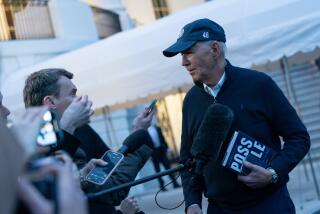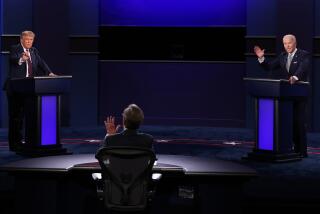Professor, Um, Studies, Um, Why We’re Tongue-Tied : Speech: Well, this researcher tries to explain, er, why we hesitate when searching for the, like, next word.
- Share via
SAN DIEGO — To er is human.
You may think you are articulate. You may see yourself as socially graceful. Even so, forget about trying to rid the ums from your patter.
Each person uses several hundred filled pauses-- um , er and like are prime examples--every day and sometimes as many as 900 an hour, estimates UC San Diego psychologist Nicholas Christenfeld.
Christenfeld studies the um phenomenon, which also includes eh, well and you know . These filled pauses signal a timeout while the speaker grapples for the next word or thought, he said.
It is the verbal equivalent of “bouncing a tennis ball before you serve,” said Christenfeld, who at 29 is the youngest member of UC San Diego’s psychology department.
And, based on analysis of speech patterns around the world, the pauses are universal, said Christenfeld, an assistant psychology professor who claims that he is a man of few ums .
But Christenfeld is still trying to figure out what he calls the fundamental question: why people utter um , especially because most believe it only makes them sound fuzzy-headed.
“Why do people say um instead of sitting quietly--given that people don’t admire people who um ,” he said.
Christenfeld believes that such utterances signal the individual’s desire to speak--though the actual words may elude the tongue, he said. It is also a sign that the speaker is weighing his verbal options and ideas.
President Bush averages 1.7 ums a minute while Vice President Dan Quayle ums along at only 0.1 a minute.
What does it mean?
“Either Quayle is a masterful speaker, a man of steel or he’s not contemplating many options when he speaks,” Christenfeld said. “I pick the latter.”
The White House declined to comment.
Asked if he has analyzed the frequency of filled pauses among the current presidential candidates, Christenfeld groaned. “It’s too painful.”
Christenfeld has, however, examined the frequency of ums in the banter of several television talk show hosts who, he presumed, got their jobs in part because of their ability to think and speak on their feet.
Johnny Carson utters 1.5 ums per minute; Arsensio Hall, 2.4, and David Letterman, 8.1, according to Christenfeld. (Pat Sajak, who briefly was host of a talk show, spoke 9.8 ums per minute--”It’s amazing he lasted as long as he did,” Christenfeld said.)
Carson and Hall were unavailable to comment.
Letterman’s personal assistant Laurie Diamond said: “Here’s the thing, um, Dave’s in rehearsal.”
Christenfeld believes that Letterman’s rate may be so high because he improvises more than the other talk show hosts.
“David Letterman certainly seems glib and facile,” Christenfeld said. “But Johnny Carson would probably say that experience counts.”
For four years now, Christenfeld has studied um and er and uh --the topics of his graduate thesis at Columbia University . He has also flirted with well and like, but those are words that have meaning even if people do use them like conversational pepper.
Clearly, Christenfeld has been won over by ums , which he confided, he usually cannot help counting--a habit that sometimes makes colleagues and acquaintances self-conscious.
“This is worth studying because it happens so much--anything that happens 10 times a minute is worth studying,” he said.
Working with Columbia psychology professor Stanley Schacter last year, Christenfeld found that the more choice of words you have in discussing a topic, the more ums you will use.
Examining 10 academic disciplines, he learned that literature and art historians um -ed almost four times more often than biologists and mathematicians.
Schacter and Christenfeld explain this by arguing that scientists must choose from a narrower, more specialized vocabulary when they speak. For example, there is no real synonym for molecule or atom, they say.
“Consider a statement such as E = mc2. There are no options,” their study says. “In contrast, consider the statement: ‘What Shakespeare probably meant in that passage from Lear was. . .’ The options seem limitless.”
So far, it does not appear that age, gender or class are a factor in how frequently a person uses a filled pause, Christenfeld said. But stress clearly affects how many ums you use. People talking to close friends will um about once or twice a minute. But those talking to their parole officer are apt to um about three times that rate, he said.
Christenfeld and UC San Diego psychology department Chairwoman Laura Schreibman acknowledge that his work is, well, offbeat. But they both believe that it will help uncover significant aspects of human behavior.
“A lot of people might look at counting ums , and say: ‘Why on Earth would this be important?’ ” Schreibman said. “Anything we do to better understand how our own behavior is affected by our social environment is very important.”
Does Christenfeld hope to understand why people say um so that it can one day be eliminated from speech?
“Oh no,” he said, “I’d be bored if we did that.”
The Um Report
In a study of the “um” phenomenom--one of the filled pauses that signal a time-out when a speaker is grappling for the next word, UCSD psychology professor Nicholas Christenfeld determined that the complexity of the conversation topic determines the number of “um’s.” Among the people and professions Christenfeld has surveyed: POLITICIAN/PERSONALITY & NUMBER OF “UM’S” PER MINUTE
President Bush: 1.7
Vice President Dan Quayle*: 0.1
TV Evangelist Pat Robertson: 7.9
TV talk show host David Letterman: 8.1
TV talk show host Arsenio Hall: 2.4
TV talk show host Johnny Carson: 1.5
PROFESSORS/LECTURERS & NUMBER OF “UM’S” PER MINUTE
Natural Sciences
Biology: 1.13
Chemistry: 1.62
Mathematics: 1.29
Psychology: 1.50
Social Sciences
Economics: 2.17
Political Science: 5.61
Sociology: 3.73
Humanities
Art History: 6.06
English Literature: 6.54
Philosophy: 1.65
* Christenfeld says the low number indicates that either Quayle is a masterful speaker or he’s not contemplating many options when he speaks.
More to Read
Get the L.A. Times Politics newsletter
Deeply reported insights into legislation, politics and policy from Sacramento, Washington and beyond. In your inbox twice per week.
You may occasionally receive promotional content from the Los Angeles Times.










